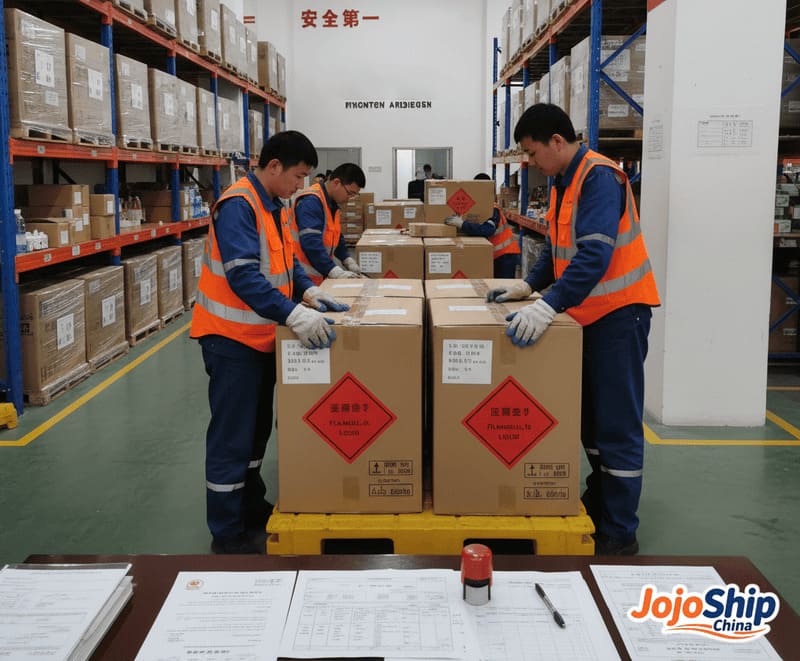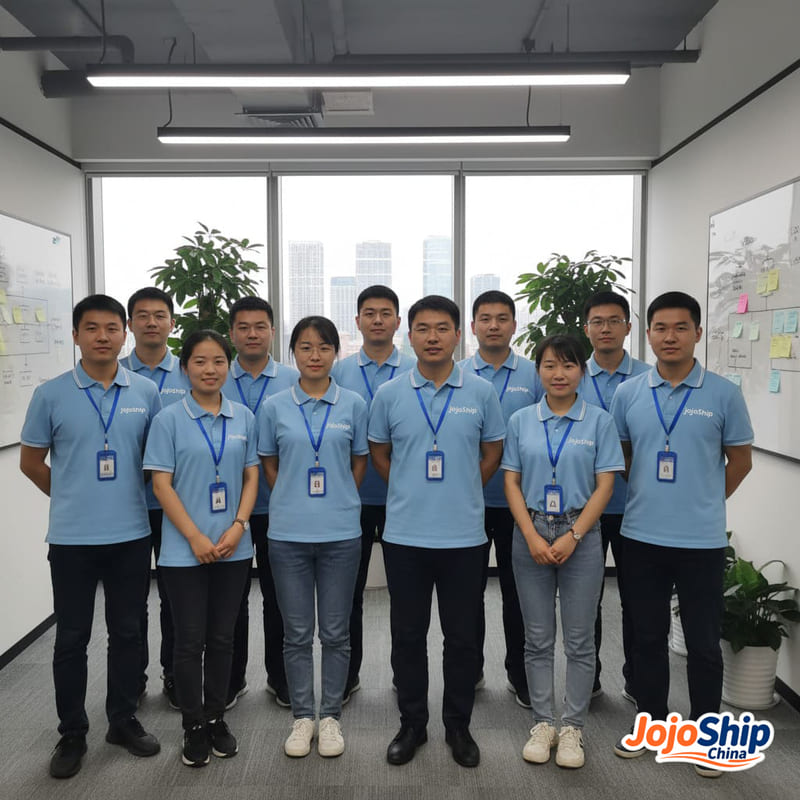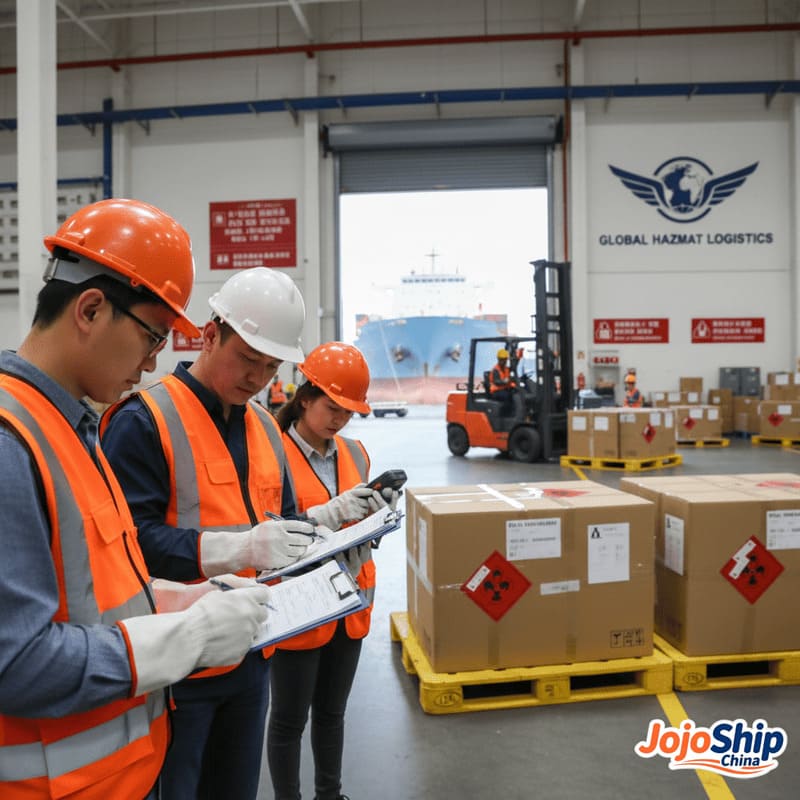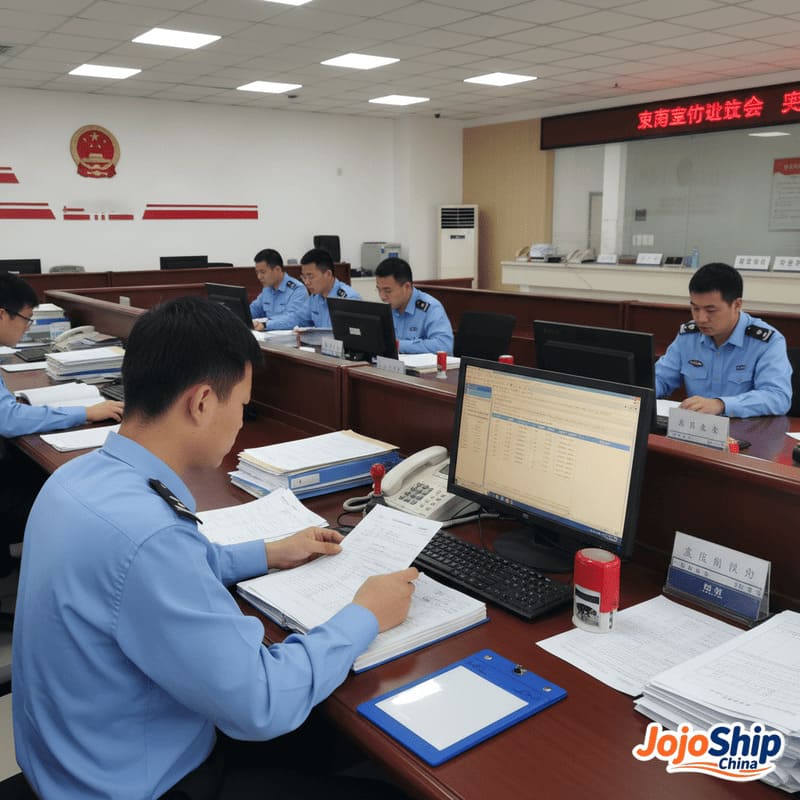Shipping hazardous materials from China presents serious compliance challenges. One wrong move can result in rejected shipments, substantial fines, dangerous safety incidents, or even criminal liability. Yet many businesses struggle to find forwarders with genuine hazardous materials expertise.
Chinese freight forwarders that reliably handle hazardous materials include JojoShip China, Ginger Logistics, ANTONG International, VCEN Logistics, Micocean International, DGL, and Huin Logistics. These companies maintain specialized DG certifications, trained staff, proper facilities, and comprehensive knowledge of international dangerous goods regulations for air and ocean freight.

Having coordinated hundreds of hazardous materials shipments from China over the years, I've learned that this specialized field requires much more than standard freight forwarding capabilities. Let me share what I've discovered about navigating this complex aspect of international logistics.
Who Is the Largest Freight Forwarder in China?
Many businesses assume that the largest freight forwarders automatically provide the best hazardous materials handling1. This misconception often leads companies to choose big-name forwarders without verifying their specific dangerous goods capabilities, resulting in shipment complications or rejections.
The largest freight forwarders in China by volume include Sinotrans, COSCO Logistics, China Merchants Logistics, and Kerry EAS Logistics. While these companies handle massive cargo volumes across all categories, specialized mid-sized forwarders like JojoShip China, Ginger Logistics, and ANTONG International often provide more dedicated expertise for hazardous materials shipments.

During my years working with Chinese logistics providers, I've found that size doesn't always correlate with specialized expertise, particularly for dangerous goods handling.
Comparing Major Chinese Freight Forwarders' Hazardous Materials Capabilities
| Freight Forwarder | Size/Ownership | Hazardous Materials Specialization | Notable DG Capabilities |
|---|---|---|---|
| Sinotrans2 | Very Large / State-owned | General capabilities across multiple divisions | Strong for industrial chemicals, comprehensive license coverage |
| COSCO Logistics3 | Very Large / State-owned | Integrated with COSCO shipping line | Specialized in tank containers and bulk chemical transport |
| Kerry EAS Logistics | Large / Hong Kong-based | Developed DG handling through acquisition strategy | Strong air freight DG handling in major Chinese airports |
| JojoShip China4 | Mid-sized / Private | High specialization in hazardous materials | Comprehensive handling across IMO classes, strong in batteries/electronics |
| Ginger Logistics5 | Mid-sized / Private | Primary focus on dangerous goods | Dedicated DG consolidation facilities in multiple Chinese ports |
| ANTONG International6 | Mid-sized / Private | Specialized hazardous materials licenses | Particularly strong in IMO classes 2, 3, 4, 5, 6, 8 and 9 |
| VCEN Logistics | Mid-sized / Private | Strong focus on chemical logistics7 | Specialized in South China chemical exports |
The largest players like Sinotrans2 and COSCO Logistics3 certainly have extensive networks and resources. Sinotrans2, which merged with China Merchants Group, handles enormous volumes across all cargo types, leveraging its position as a state-owned enterprise with connections throughout China's transportation infrastructure. Their dangerous goods capabilities are substantial but often vary significantly between different regional branches.
COSCO Logistics3 benefits from integration with one of the world's largest shipping lines, providing certain advantages for hazardous ocean freight. However, I've found their focus tends to be on larger volume dangerous goods shipments rather than specialized or smaller consignments.
When I first needed to ship lithium batteries from Shenzhen to Europe, I initially approached one of these larger forwarders. While they technically offered the service, the process was cumbersome, expensive, and lacked the specialized knowledge I needed. Switching to a mid-sized specialist like JojoShip China4 resulted in much smoother handling, proper documentation, and efficient routing.
What I've discovered is that mid-sized forwarders that specifically focus on dangerous goods often invest more heavily in specialized training, facilities, and relationships with carriers who accept these challenging shipments. Companies like Ginger Logistics5 and ANTONG International6 have built their business models around hazardous materials expertise rather than treating it as just one service among many.
These specialized providers typically maintain dedicated dangerous goods warehouses8 in key Chinese export hubs like Shanghai, Shenzhen, Guangzhou, and Ningbo. They employ staff with extensive dangerous goods training and certification, and maintain close relationships with carriers who specialize in hazardous freight.
For businesses regularly shipping hazardous materials from China, I've found these specialized mid-sized forwarders often provide more attentive service, deeper technical knowledge, and more creative solutions when inevitable challenges arise with dangerous goods shipments.
How to Ship Hazardous Materials Internationally?
Many businesses approach hazardous materials shipping9 with dangerous misconceptions, believing they can simply book standard freight and mention the dangerous nature of the goods later. This approach inevitably leads to rejected bookings, returned shipments, substantial fines, or worse—creating unnecessary costs and delays.
To ship hazardous materials internationally from China, you must first properly classify the goods according to UN numbers and hazard classes, prepare compliant packaging with appropriate markings and labels, create accurate dangerous goods declarations, select carriers certified for your specific hazard type, and work with a specialized freight forwarder like JojoShip China or Ginger Logistics that has DG expertise.

Having coordinated hundreds of dangerous goods shipments from China, I've developed a systematic approach that ensures compliance while minimizing complications.
Essential Steps for International Hazardous Materials Shipping from China
| Step | Critical Requirements | Common Pitfalls |
|---|---|---|
| Classification | Accurate UN number, proper shipping name, hazard class, packing group | Relying solely on supplier information without verification |
| Documentation | Material Safety Data Sheet (MSDS), dangerous goods declaration10 | Incomplete or non-compliant documentation formats |
| Packaging | UN-certified packaging11 appropriate for the hazard class | Using regular packaging that doesn't meet hazmat standards |
| Labeling & Marking | Proper hazard labels, UN number markings, orientation arrows | Missing or incorrectly applied labels |
| Carrier Selection | Carriers with appropriate certifications for your specific materials | Assuming all carriers accept all types of hazardous materials |
| Route Planning | Understanding country-specific restrictions and port limitations | Overlooking transit country restrictions |
| Forwarder Expertise | Working with DG-certified logistics providers12 | Choosing forwarders without specific hazmat experience |
| Compliance Verification | Pre-shipment inspection of packaging, documents, and markings | Failing to verify compliance before shipment |
The first critical step is always accurate classification. I work with clients to obtain comprehensive Material Safety Data Sheets (MSDS)13 from their Chinese suppliers, then verify the classification independently. Many shipping problems occur because suppliers incorrectly classify their products or don't provide complete information.
Packaging requirements for hazardous materials are strictly regulated and vary by hazard class. When shipping lithium batteries from China, for example, I ensure the packaging meets UN 4G standards with proper cushioning materials, clear markings, and battery disconnection or protection against short-circuits. Generic packaging is never acceptable for hazardous materials.
Documentation is another area where specialized knowledge is essential. A properly completed dangerous goods declaration10 requires specific formatting, accurate technical information, and authorized signatures. When working with forwarders like ANTONG International or JojoShip China, their dangerous goods specialists prepare these documents to ensure compliance with both Chinese export requirements and international regulations.
Carrier selection becomes critically important with hazardous shipments. Not all airlines or ocean carriers accept all classes of dangerous goods, and their policies change frequently. Specialized forwarders maintain updated information on which carriers accept specific hazardous materials on particular routes, allowing them to book appropriate transportation.
Chinese port restrictions further complicate hazardous materials shipping9. Some ports have strict limitations or complete prohibitions on certain dangerous goods. For instance, Shanghai has different requirements than Ningbo or Shenzhen. Experienced forwarders like Ginger Logistics and VCEN Logistics know these restrictions and can route shipments through appropriate ports.
Customs clearance for dangerous goods requires additional expertise. Both Chinese export customs and destination import customs apply extra scrutiny to hazardous shipments. I've found that forwarders with dedicated dangerous goods departments coordinate more effectively with customs authorities, reducing the risk of delays or rejections.
Finally, emergency response is an often-overlooked aspect of hazardous materials shipping9. International regulations require emergency contact information and response protocols for dangerous goods shipments. Specialized forwarders maintain these resources or connect with international emergency response providers to ensure compliance.
Do Chinese Freight Forwarders Handle Customs?
A persistent misconception among importers is that Chinese freight forwarders14 only manage transportation while customs clearance requires separate providers. This misunderstanding often results in fragmented shipping arrangements, unclear responsibilities, and customs delays that could easily be avoided.
Yes, most established Chinese freight forwarders that handle hazardous materials also provide comprehensive customs clearance services, including export customs in China and often import customs assistance in destination countries. Companies like JojoShip China, ANTONG International, and Micocean International manage all documentation, classification, duty calculations, and customs communication as part of their dangerous goods shipping services.

From my experience managing hazardous materials shipments from China, I've found that integrated customs handling is particularly important for dangerous goods.
Key Customs Services Provided by Chinese Hazardous Materials Freight Forwarders
| Customs Service | Relevance to Hazardous Materials | Value Added |
|---|---|---|
| Export Declaration | Accurate reporting of hazardous contents to Chinese customs | Prevents export delays and compliance issues |
| HS Code Classification15 | Proper tariff classification of dangerous goods | Ensures correct duty calculations and regulatory treatment |
| Permit & License Management16 | Handling of special permits required for hazardous exports | Addresses restricted/controlled substances requirements |
| Documentation Verification17 | Checking MSDS, certificates of analysis, dangerous goods declarations | Prevents document-related customs holds |
| Customs Inspection Coordination18 | Managing physical inspections of dangerous goods | Ensures proper handling during examination process |
| Customs Bond Arrangements | Financial guarantees sometimes required for hazardous materials19 | Facilitates smoother clearance of high-risk goods |
| Destination Customs Support20 | Coordination with import customs brokers | Ensures consistent information throughout the supply chain |
| Compliance Advisory21 | Guidance on regulatory requirements for specific hazardous materials19 | Prevents non-compliance issues before they occur |
Chinese freight forwarders14 specializing in hazardous materials6 typically offer more comprehensive customs services than general forwarders. This specialization is crucial because dangerous goods face heightened regulatory scrutiny at every step of the export process.
Export customs clearance in China involves several government agencies for hazardous materials19. Beyond standard customs procedures, shipments may require approvals from entities like the Ministry of Environmental Protection or the State Administration for Market Regulation. Experienced forwarders like VCEN Logistics and JojoShip China coordinate with all relevant authorities as part of their service.
The classification of hazardous materials19 for customs purposes requires specialized knowledge. When I worked with a client shipping laboratory chemicals from Shanghai, JojoShip's customs team correctly classified each substance according to both the Harmonized System (HS) codes and dangerous goods regulations, ensuring proper treatment by both customs and transportation providers.
Documentation preparation is particularly complex for hazardous shipments. Chinese customs requires standard export documents plus additional permits, safety data sheets, and dangerous goods declarations. Specialized forwarders maintain expertise in preparing these documents correctly, reducing the risk of customs delays or rejections.
For businesses shipping hazardous materials regularly, many Chinese forwarders offer customs compliance consulting beyond basic clearance services. Companies like Micocean International and Huin Logistics provide guidance on regulatory changes affecting specific categories of dangerous goods, helping businesses maintain compliance as requirements evolve.
The customs clearance aspect becomes even more valuable when shipping to countries with strict import regulations for hazardous materials. Forwarders like JojoShip China with offices or partners in destination countries can coordinate both export clearance in China and import clearance abroad, ensuring consistent handling of your dangerous goods shipment throughout its journey.
Physical customs inspections occur more frequently with hazardous materials. When Chinese customs selects a dangerous goods shipment for examination, having a forwarder with hazmat expertise is invaluable. They coordinate with customs officials, ensure proper handling during inspection, and address any questions or concerns immediately.
I've found that freight forwarders specializing in hazardous materials19 often develop strong relationships with customs officials at major Chinese ports. These relationships don't circumvent regulations but do facilitate smoother communication and faster resolution when questions arise about dangerous goods shipments.
Conclusion
For shipping hazardous materials from China, I recommend specialized freight forwarders like JojoShip China, Ginger Logistics, and ANTONG International that offer comprehensive dangerous goods expertise. These companies maintain proper certifications, trained staff, and robust compliance systems to navigate complex DG regulations. When selecting a partner, verify their specific hazard class experience and request case studies of similar shipments they've handled successfully to ensure safe and compliant transport.
-
Understanding best practices can help ensure safe and compliant shipping of dangerous goods. ↩
-
Explore Sinotrans' capabilities to see how they manage hazardous materials effectively. ↩ ↩ ↩
-
Learn about COSCO's specialized services for dangerous goods and their shipping advantages. ↩ ↩ ↩
-
Discover why JojoShip China is preferred for hazardous materials and their unique handling expertise. ↩ ↩
-
Find out how Ginger Logistics excels in handling dangerous goods with dedicated facilities. ↩ ↩
-
Explore ANTONG's specialized licenses and their focus on hazardous materials shipping. ↩ ↩ ↩
-
Understanding the challenges can help businesses navigate the complexities of chemical logistics. ↩
-
Learn how dedicated warehouses enhance safety and compliance in hazardous materials shipping. ↩
-
Understanding the regulations is crucial for compliance and avoiding costly mistakes. ↩ ↩ ↩
-
A correctly filled declaration is essential for legal shipping and avoiding fines. ↩ ↩
-
Knowing packaging requirements helps prevent shipping delays and ensures safety. ↩
-
These providers specialize in hazardous materials, ensuring compliance and safety. ↩
-
MSDS are vital for ensuring safe handling and compliance during shipping. ↩
-
Explore this link to understand the full range of services offered by Chinese freight forwarders, including customs handling. ↩ ↩
-
Discover the importance of HS Code Classification and how it affects shipping costs and compliance. ↩
-
This link will explain the significance of managing permits and licenses for hazardous exports. ↩
-
Learn how proper documentation verification can prevent customs delays and ensure compliance. ↩
-
Explore how effective coordination during customs inspections can facilitate smoother shipping. ↩
-
This resource will provide crucial information on the regulations surrounding hazardous materials shipping. ↩ ↩ ↩ ↩ ↩
-
Find out how destination customs support can enhance the efficiency of your shipping process. ↩
-
This resource will help you understand how compliance advisory can prevent non-compliance issues. ↩




